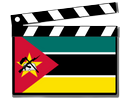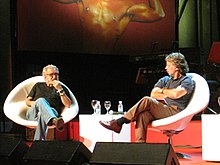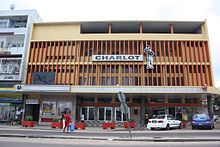Cinema of Mozambique
| Cinema of Mozambique | |
|---|---|
 |
The cinema of Mozambique (Portuguese: Cinema de Moçambique) refers to the films and the film industry of Mozambique, which creates films in Portuguese (see List of Mozambican films). Furthermore, some foreign films have been produced about Mozambique or were shot there, such as Sidney Pollack's 2005 The Interpreter, Edward Zwick's 2006 Blood Diamond, and Teresa Prata's 2007 Sleepwalking Land (Terra Sonambula), an adaptation of the novel by Mozambican author Mia Couto.[1][2]
History
[edit]




After the independence of Mozambique on June 25, 1975, the new marxist regime of the FRELIMO party invested in cinematic film production to show its own vision. It invited established European film directors like French Jean Godard (1930–2022) and Jean Rouch (1917–2022) to work on film and video projects in Mozambique in the years 1977-1998: Godard to research video for television and Rouch for a Super 8 film project teaching at the Communications Department of Eduardo Mondlane University, while the Portuguese-Brazilian film director Ruy Guerra (born in Maputo, 1931) worked at the Maputo Instituto Nacional de Cinema (INC) founded by FRELIMO in 1976.[3][4][5] For instance Brazilian-Mozambican director Licínio Azevedo worked with Godard and Guerra in Maputo,[6] or at least felt the influence of Godard and Rouch.[4] In 2003 the Portuguese film maker Margarida Cardoso directed the documentary Kuxa Kanema: The Birth of Cinema detailing the founding of the National Institute of Cinema.
Mozambican film directors
[edit]Well-known Mozambican film directors include Fátima Albuquerque, Licínio Azevedo, José Cardoso (born 1939), Chico Carneiro, Sol de Carvalho (born 1953 in Beira, Mozambique), Yara Costa, Mickey Fonseca, Victor Lopes,[7] Rogério Manjate, Orlando Mesquita Lima (born 1962 in Nampula),[8] Isabel Noronha, Pedro Pimenta (born 1955),[9] Camilo de Sousa, and Lara Sousa. British film maker Karen Boswall worked in Mozambique between 1993 and 2007.
Popular Mozambican films
[edit]In 2016, according to the Internet Movie Database the most popular Mozambican films were the following:[10]
| Year | Film | Genre | Director | Starring | Duration |
|---|---|---|---|---|---|
| 1977 | 25[11] | Documentary on Mozambique's independence and President Samora Machel's revolutionary government. | Celso Luccas, José Celso Martinez Corrêa | Samora Machel | 120 m |
| 1998 | Nelio's Story / Comédia Infantil[12] | Drama feature, based on Henning Mankell's 1995 novel Comédia infantil. Nelio, a young boy wounded in the Mozambican civil war, relates how he survived. | Solveig Nordlund | Evaristo Abreu, Adelino Branquinho, Augusto Cabral | 93 m |
| 2003 | Disobedience / Desobediência | Drama feature. Rosa is accused of having caused the suicide of her husband. | Licínio Azevedo | Rosa Castigo, Tomás Sodzai | 92 m |
| 2007 | Another Man's Garden / O Jardim do Outro Homem[13] | Drama feature. Medical student Sofia finds that her professor wants more from her than just hard work. | Sol de Carvalho | Evaristo Abreu, Timóteo Maposse, Maria Amélia Pangane | 80 m |
| 2012 | Virgin Margarida / Virgem Margarida | Drama feature. By mistake Margarida, a sixteen-year-old girl from the countryside, was arrested in a 1975 Maputo sweep of all the prostitutes. | Licínio Azevedo | Iva Mugalela, Hermelinda Cimela, Sumeia Maculuva | 90 m |
| 2014 | Yvone Kane[14] | Drama feature. Rita returns to her childhood's Africa to investigate the death of Yvone Kane, a former political activist and guerrilla fighter. | Margarida Cardoso | Beatriz Batarda, Irene Ravache, Samuel Malumbe | 117 m |
| 2016 | The Train of Salt and Sugar / Comboio de Sal e Açúcar | Adventure feature. In the Mozambican civil war, a train with passengers hoping to trade salt for sugar travels 500 miles through RENAMO guerrilla-held territory. | Licínio Azevedo | Thiago Justino, Absalão Maciel, Matamba Joaquim | 93 m |
Literature
[edit]- Convents, Guido (2009). Een andere kijk op cinema : film en audiovisuele cultuur in Mozambique / Deel I. Filmcultuur in koloniaal Mozambique (1896–1975) [Another look at cinema : film and audiovisual culture in Mozambique / Part I. Film culture in colonial Mozambique (1896–1975)]. Cinemagie. Driemaandelijks filmtijdschrift, jrg. 48 (zomer 2009) 267 (in Dutch). [Laken] (Belgium): Vzw Filmmagie. OCLC 793579548.
- Convents, Guido (2010). Een andere kijk op cinema : film en audiovisuele cultuur in Mozambique / Deel II. Filmcultuur in het onafhankelijke Mozambique (1975–2010) [Another look at cinema : film and audiovisual culture in Mozambique / Part II. Film culture in the independent Mozambique (1975–2010)]. Cinemagie. Driemaandelijks filmtijdschrift, jrg. 49 (zomer 2010) 271 (in Dutch). [Laken] (Belgium): Vzw Filmmagie. OCLC 793579588.
- De Medeiros, Paulo; Apa, Livia, eds. (2021). Contemporary Lusophone African Film : transnational communities and alternative modernities. London and New York: Routledge Taylor & Francis Group. ISBN 9780367134976. OCLC 1176322750.
- Gray, Ros (2020). Cinemas of the Mozambican revolution : anti-colonialism, independence and internationalism in filmmaking, 1968-1991. Woodbridge, Suffolk: James Currey. doi:10.2307/j.ctvktrx4b. ISBN 9781847012371. JSTOR j.ctvktrx4b. OCLC 1140135081. Retrieved 18 April 2024. Full text PDFs online at www.cambridge.org, consulted on April 18, 2024.
See also
[edit]- Category:Cinema of Mozambique
- Category:Mozambican film directors
- List of Mozambican films
- List of Portuguese films
References
[edit]- ^ Gray, Ros (2020). Chapter Conclusion. Pages 255-264.
- ^ Power, Marcus (2004). "Post-Colonial cinema and the reconfiguration of Moçambicanidade". Lusotopie: 261–278. Retrieved 2024-04-18.
- ^ Instituto Nacional de Cinema de Moçambique INC, National Cinema Institute of Mozambique, since 2000 Instituto Nacional de Audiovisual e Cinema de Moçambique INAC). Convents (2009), p.7.
- ^ a b Owen, Hilary (2021). "In the name of the Rosa. The ethnographic reflex in the cinema of Licínio Azevedo". In De Medeiros, Paulo; Apa, Livia (eds.). Contemporary Lusophone African Film : transnational communities and alternative modernities. London and New York: Routledge Taylor & Francis Group. p. 114. ISBN 9780367134976. OCLC 1176322750.
- ^ Gray, Ros (2020). Pages 1, 68, 109, 113, 116, and 118.
- ^ "Licínio Azevedo – Infopédia". Infopédia – Porto Editora (in Portuguese). Infopédia Dicionários Porto Editora. Retrieved 2024-04-11.
- ^ Victor Lopes at IMDb
- ^ "Orlando Mesquita Lima". Africanfilmny.org. New York: African Film Festival. Retrieved 11 April 2024.
- ^ Miguel, Amâncio (28 June 2018). "Cineasta moçambicano Pedro Pimenta na Academia de Hollywood". voaportugues.com (in Portuguese). VOA Português - Voz da America (Voice of America). Retrieved 18 July 2024.
O cineasta moçambicano Pedro Pimenta foi convidado para ser membro da Academia de Artes e Ciências Cinematográficas dos Estados Unidos, responsável pela atribuição das estatuetas Óscar.
[Mozambican filmmaker Pedro Pimenta has been invited to become a member of the United States Academy of Motion Picture Arts and Sciences, which is responsible for awarding the Oscar statuettes.] - ^ "Most Popular Titles With Country of Origin Mozambique". imdb.com. IMDb.com, Inc. An Amazon.com company. Archived from the original on 2016-07-30. Retrieved 11 April 2024.
- ^ "25. Quinzaine 1977. Feature film. 2h". quinzaine-cineastes.fr. Quinzaine des cinéastes Cannes. Société des réalisateurs de films. Retrieved 18 July 2024.
- ^ Barlet, Olivier (31 January 2000). "Comédia infantil De Solveig Nordlund". africultures.com (in French). Africultures, les mondes en relation. Retrieved 18 July 2024.
- ^ "Another Man's Garden (O Jardim do Outro Homem)". Archived from the original on 2019-11-03. Retrieved 18 July 2024.
- ^ "Yvone Kane, Margarida Cardoso". festivaldorio.com.br (in Portuguese). Festival do Rio. 2024. Retrieved 18 July 2024.

